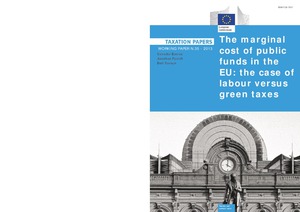The marginal cost of public funds in the EU: the case of labour versus green taxes
"One key objective of tax-based fiscal consolidations which is too often disregarded in public debate is to minimise economic distortions. This paper uses a computable general equilibrium model to gauge these potential distortions by calculating the marginal cost of public funds (MCF) for EU me...
| Main Authors: | , , |
|---|---|
| Institution: | ETUI-European Trade Union Institute |
| Format: | TEXT |
| Language: | English |
| Published: |
Luxembourg
2013
Office for Official Publications of the European Communities |
| Subjects: | |
| Online Access: | https://www.labourline.org/KENTIKA-19126404124919446869-The-marginal-cost-of-public-fu.htm |
| Summary: | "One key objective of tax-based fiscal consolidations which is too often disregarded in public debate is to minimise economic distortions. This paper uses a computable general equilibrium model to gauge these potential distortions by calculating the marginal cost of public funds (MCF) for EU member states. We consider two specific tax categories which are often proposed as good candidates for efficiency-enhancing tax shifting policies: labour and green taxes. Our analysis suggests that the economic distortions provoked by labour taxes are significantly larger than for green taxes. This result suggests that a green-taxes oriented fiscal consolidation would be preferred to a labour-tax oriented one (assuming that both tax increases would yield the same tax revenues). This holds for all EU member states modelled and despite the fact that potential welfare enhancement through pollution abatement are cancelled-out. Nevertheless, this result is slightly less strong when one considers the spillover effects between countries, which are more pronounced (in relative terms) for green taxes. This suggests that the use of green taxes for fiscal consolidation would be more effective were there to be close coordination across EU countries. In addition the efficiency losses associated with labour taxes are also likely to be greater when labour markets are less flexible (from an efficiency-wage perspective), a result also found to a small extent for green taxes. This raises the possibility that undertaking structural reforms (especially in the labour market) would help to minimize the efficiency losses entailed by tax-driven fiscal consolidations." |
|---|---|
| Physical Description: | 44 p. Digital |

